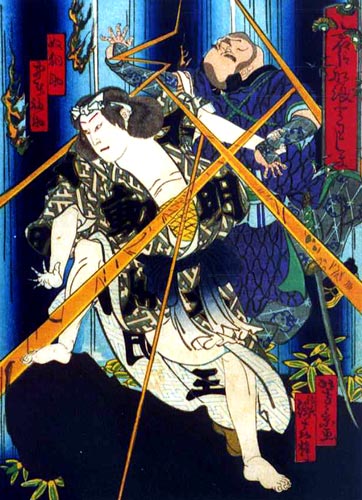| UWAJIMA SďDď |
| Play title | Kimi-wa-Fune Nami no Uwajima |
| Authors | Katsu Genz˘ II (original playwright) Tobe Ginsaku, Nagawa Sh˘suke (revisions) |
| History |
The drama "Kimi-wa-Fune Nami no Uwajima" was premiered at the Chikugo no Shibai in October 1873 [casting]. It was successfully revived by Ichikawa Ennosuke III in April 1977 at the Meijiza [casting]. It belongs to the Ennosuke Jűhachiban collection of dramas. |
| Structure |
The latest revision of "Kimi-wa-Fune Nami no Uwajima" (July 2000) was made up of 4 acts and 11 scenes. |
| Key words |
Ennosuke Jűhachiban Ennosuke Shijűhassen Fukkatsu T˘shi Ky˘gen Jűhachiban Iyo Kaya Keren S˘d˘ |
| Summary |
Typical of Kabuki plays about disturbances in daimy˘ families, "Uwajima" centers on two factions fighting for supremacy in the house of the Date lords of Uwajima in Iyo Province (Ehime Prefecture) on Shikoku. Lord Date T˘t˘mi-no-Kami has been commissioned by the shogunate to raise 50,000 gold pieces for the construction of levees along a river. Meanwhile, the daimy˘'s favorite mistress Otatsu has been scheming with the evil minister ďhashi Uzen to eliminate the daimy˘'s young heir Harumatsu and have her son Hanawaka succeed to the lordship of Uwajima. The play begins with a scene in which Otatsu arranges for a Date family heirloom, an arrowhead named Usui, to be stolen during Lord Date's absence. Ochi Isonoj˘, who was responsible for the lost heirloom, and his lover Kariya flee the castle on a hunt for the stolen arrowhead. The ghost of Otatsu's ancestor Ch˘sokabe Mitsuchika emerges from the shrine of Sasayama Gongen and urges Uzen to help Otatsu in her attempt to seize control of Iyo Province. Lord Date's loyal retainers, Yanbe Seibŕ, Kariya's elder brother, and Ochi Buemon, Isonoj˘'s elder brother, are ordered by Wake Sanzaemon and other senior retainers of Uzen's faction to transport the 50 chests of gold coins to Edo by ship. Bad weather forces them to postpone their sailing, and, while waiting, Seibŕ falls ill from worrying about the precious cargo. Trapped in a mosquito net at an inn, Seibŕ is murdered by Uzen's men. They then steal the money and pin the blame on Buemon. Two years pass. Lord Date's son Harumatsu is hiding in the mountains of Iyo, guarded by Buemon's wife Takino, his governess. Traveling to search for his missing mother, Buemon's son Bunosuke comes to Takino's humble abode, accompanied by his servant Manpei. Takino is trying to persuade Bunosuke to leave, for young Lord Harumatsu's safety, when Harumatsu comes out and asks Takino to let Bunosuke stay with them. Hearing from Manpei that Buemon is being imprisoned by Uzen, Takino decides to go to her husband's rescue. The following act finds Seibŕ's servant D˘suke and Seibŕ's pretty widow Hatsune running a teahouse located on the border of Mino and ďmi provinces (Gifu and Shiga prefectures). In order to protect his master's family, D˘suke, who makes his living as a palanquin bearer, treats Hatsune as his wife, Seinosuke as his son and Seibŕ's mother as his own mother. Hatsune's neighbor Gengor˘, a gangster, suspects that Isonoj˘ and Kariya are hiding in the teahouse and plots to inform the authorities. Hatsune has borrowed 15 gold pieces from Gengor˘, and in order to settle the debt she asks Oen, the proprietress of a brothel, to hire her and receives 15 gold pieces as advance payment. On her way with Oen in a palanquin, Hatsune is abducted by Gengor˘ and his gang. Enraged at Hatsune for rejecting him, Gengor˘ kills her after telling her how her husband was murdered. D˘suke arrives on the scene, carrying Seinosuke on his back, just as Hatsune dies. Gengor˘ grabs Seinosuke from D˘suke and starts to flee. Standing in the pool of the waterfall, D˘suke stabs himself in the belly, and prays to the gods to help him. Miraculously, Gengor˘ is drawn back to where D˘suke stands, and the dying D˘suke stabs him. Isonoj˘ retrieves the stolen arrowhead from Gengor˘, while Kariya hugs her nephew Seinosuke. The two young people decide on the spot to return to Uwajima to avenge Seibŕ's death. Source: Sasaguchi Rei |
| Comments |
"Uwajima S˘d˘ (The Uwajima Incident)" is one of the Kabuki plays Ichikawa Ennosuke has successfully revived. He has worked over the script and made his production even more exciting by the use of quick changes onstage and spectacular effects. |
 |
|
The actor Nakamura Fukusuke III playing the role of the yakko D˘suke in the drama "Kimi-wa-Fune Nami no Uwajima", which was staged in August 1885 at the Kado no Shibai (print made by Got˘ Yoshikage) |
|
|
| Contact | Main | Top | Updates | Actors | Plays | Playwrights | Programs | Links | FAQ | Glossary | Chronology | Illustrations | Prints | Characters | Derivatives | Theaters | Coming soon | News |